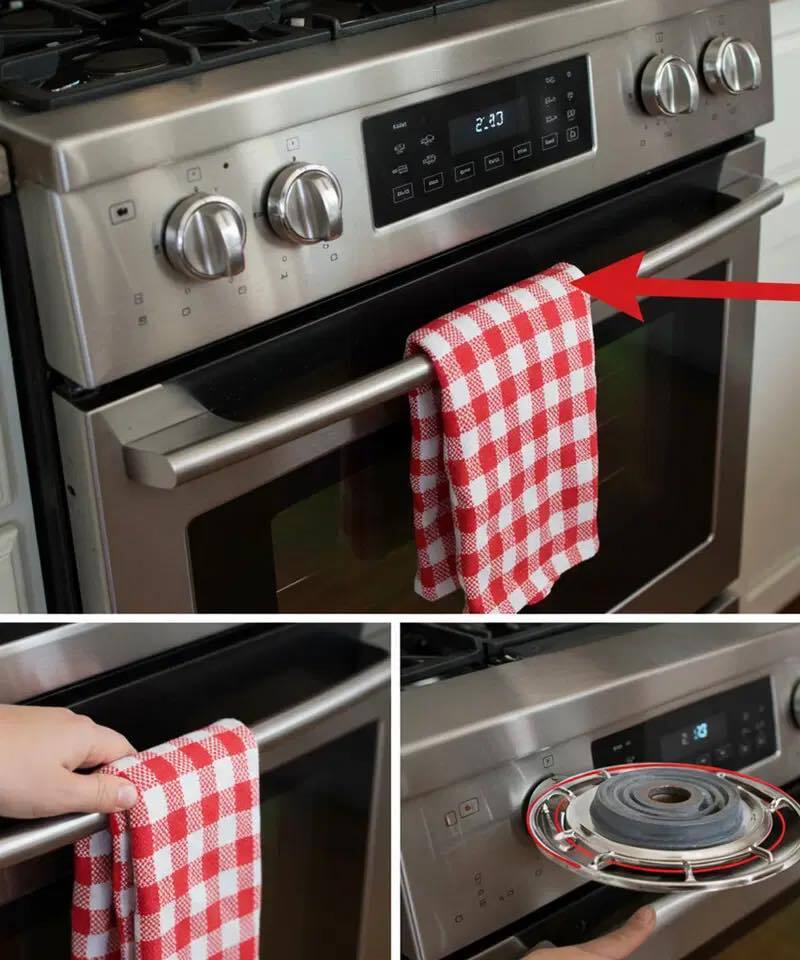Kitchen towels are one of the most frequently used items in any household. They come in handy for drying dishes, wiping countertops, cleaning up spills, and drying hands during meal prep. Because they’re used so often, most people like to keep them easily accessible. A common habit is to drape them over the oven door handle—it’s convenient, it’s within reach, and it seems harmless. But surprisingly, this is a mistake many of us make without realizing it, and it can have some unpleasant consequences.

Hanging your kitchen towel on the oven door may seem like a clever way to dry it quickly, especially after heavy use, but this habit can actually compromise both hygiene and safety. The primary purpose of a dish towel is to help maintain cleanliness in the kitchen. Whether you’re using it to dry freshly washed plates, clean spills on your cooking surfaces, or dry your hands while handling food, that towel plays a key role in preventing cross-contamination and minimizing the spread of bacteria. But what happens when that same towel comes into contact with one of the most frequently touched surfaces in your kitchen—the oven door? Think about how often you grab the oven handle while your hands are greasy, coated in flour, or even after handling raw meat. Most of us don’t stop to wash our hands before opening the oven.
That handle becomes a hotspot for bacteria, collecting all the germs and grime from whatever we’ve been doing. Now, if you drape a clean towel over it, that towel is picking up those same germs. Later, when you use it again, you’re spreading those bacteria around—onto your dishes, your hands, and other surfaces. It completely defeats the purpose of having a clean towel in the first place. In addition to hygiene concerns, there’s also the risk of fire. Dish towels are made from cloth, and when placed too close to heat—especially on an active oven—they can pose a real fire hazard. Even if the towel doesn’t catch fire, it can still degrade from repeated exposure to heat, which makes it wear out faster and reduces its effectiveness. It might also develop unpleasant odors from being constantly warmed without being properly washed.
The best solution is to find a dedicated spot for your kitchen towels—somewhere clean, dry, and away from heat sources. Towel hooks, drawer handles, or even a small towel rack near the sink are better alternatives. Not only does this keep the towel out of harm’s way, but it also helps prevent unnecessary contamination. But proper placement is only part of the equation. You also need to clean your kitchen towels thoroughly and regularly. Tossing them in with your regular laundry isn’t enough to ensure they’re free of bacteria.
These towels come into contact with all kinds of substances—raw food residue, dirt, grease, and even cleaning chemicals. To properly disinfect them, it’s recommended to wash kitchen towels in a hot washing machine cycle—ideally around 90°C (or 194°F). That level of heat will kill most bacteria and help remove deep-seated stains and odors. For an even better result, try adding a little baking soda to the drum during the wash. Baking soda is known for its deodorizing properties and can also help lift stubborn stains. It’s a simple, natural way to enhance your wash without relying on harsh chemicals. Keeping your kitchen towels clean and properly stored may seem like a small detail, but in a space where food safety is a top priority, it makes a big difference. These small habits can prevent contamination, reduce the risk of illness, and extend the life of your towels. So next time you reach to hang your towel on the oven door, pause and consider a better alternative. Clean kitchens don’t just come from clean counters—they start with clean habits.





